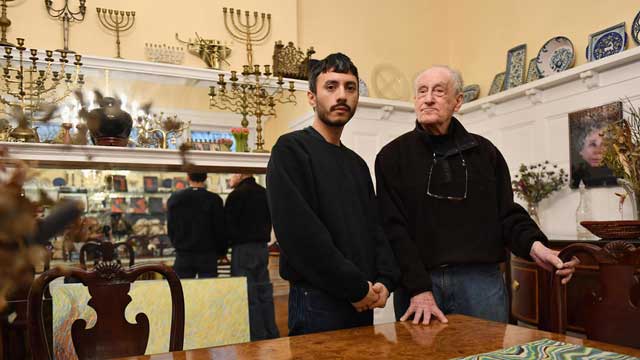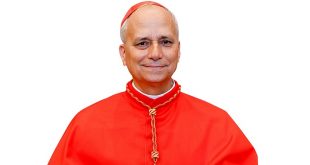
New York, United States | AFP | Daniel Terna experienced neither the Holocaust that nearly killed his father nor the war that spawned it, but since childhood he has been immersed in the inherited trauma.
It’s been 75 years since the liberation of concentration camps in Nazi Germany, four of which Frederick Terna passed through, including Auschwitz.
But still today the Jewish 96-year-old of Czech origin, a prolific painter whose 32-year-old son is also an artist, is reminded daily of the horrific experience that wiped out his immediate family.
Daniel too inhabits those dark memories: “In the same way that my father lives with the Holocaust every day, I live with it.”
“Not a day goes by that you don’t think about your father and what he’s gone through,” he told AFP from their peaceful Brooklyn home. “You can’t really understand it. You can’t conceptualize of it.”
“But I never stop thinking about it.”
– ‘Just a fact’ –
When Daniel was a child Frederick, who was released in 1945 from the Kaufering labor camp in Bavaria, recalls the Holocaust “was a subject matter that did not have to be elaborated on.”
He did not make a particular effort to explain the suffering to Daniel: “It didn’t have to be talked about… it was in the atmosphere.”
The product of Frederick’s second marriage — his first wife also survived the camps but passed away later on — Daniel recalls “it was just a fact.”
“The world ‘Holocaust’ is mentioned so often” that little “shroud of darkness” remains, he said.
As a child he said he was mostly interested “in the gory details,” and drew “disturbing” pictures that included Nazi soldiers at death camps.
With hindsight Daniel says the black and white archival images “proved both confounding and influential.”
“Piles of naked bodies or rows of shuffling prisoners seemed otherworldly, and frankly impossible for me to understand,” he said.
“I simply couldn’t imagine my living, breathing, life-filled father as one of those individuals.”
– ‘Maus’ –
If he was embarrassed of his father as a child — Frederick was older than the average dad of kids Daniel’s age — today the artist and gallerist is proud.
He says discovering the serialized graphic novel “Maus” — the 1992 Pulitzer Prize winner that sees the author Art Spiegelman interview his father about surviving the Holocaust — brought into relief what his father’s generation went through.
Still today Daniel says that “people in uniform” unnerve his father.
The 32-year-old sees some of these traits in himself: Daniel also avoids uniforms and firearms, and never goes anywhere without an identification document.
Germany brought the father and son back to the tragic scene, inviting Frederick in 2015 to a ceremony at the Dachau camp marking the liberation’s 70th anniversary.
At 90, he did not particularly want to return, but wanted to show Daniel himself what was there.
Both father and son had the impression of a “facade,” as Frederick put it, upon entering the site, with Daniel dubbing it “a Disneyland version of the camps.
The duo also went to Prague, whose pre-war atmosphere had evaporated, Frederick said.
“I don’t think it can be” recreated he said, to which he voiced relief: “It’s a kid’s nightmare.”
– Identity shaping –
He’s deeply engaged in his father’s trauma but Daniel, an experimental photographer and documentary filmmaker, says he is not weighed down by the family history.
“I am who I am, and my father’s history and past have shaped my identity,” he said.
But “I don’t consider myself more or less pessimistic than any other New Yorker,” he said.
“Our cynicism is a bit of a shtick, and I like the humor of it very much.”
His father, family and their archives still have become a major source of inspiration for his work, and for the art gallery he created in the basement of the family home.
In 2017 he organized an exhibition of his father’s paintings there.
“So much of my work that I do as an artist is about him,” Daniel said, adding that Frederick’s own “paintings are extensions of him when he’s no longer in this world. Those will last for longer than all of us.”
“I am trying to accumulate as much material as I can physically and emotionally. So those will be the sort of the living proof of my dad.”
As his generation begins to disappear Frederick, like Daniel, hopes his paintings will preserve his memory.
“The way I live, the way I write, the way I paint says something about my generation and the experience of my generation,” he said. “It’s one tiny facet, one little stone in that mosaic.”
“It may eventually add up to the others to make some sense.”
 The Independent Uganda: You get the Truth we Pay the Price
The Independent Uganda: You get the Truth we Pay the Price



